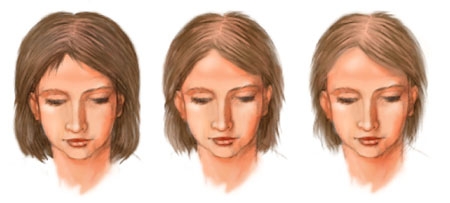Patients with hair loss often wonder if their condition could be due to a nutritional disorder. Modern studies show that diffuse alopecia can occur against the background of protein and microelement deficiencies.
Thus, the doctor's task in this case is to make up for this deficiency in time. One of the most common causes of hair loss is zinc deficiency. Read more about the role of this trace element in the body, as well as its use for the treatment of diffuse alopecia, read on estet-portal.com in this article.
What is diffuse alopecia
Diffuse alopecia is a pathological hair loss that can be caused by various internal and external causes:
• genetic predisposition;
• exposure to stress factors;
• toxic damage;
• endocrine and autoimmune diseases;
• inflammatory lesions of the scalp;
• deficit states.
There are two types of diffuse alopecia: telagen and anagen.
Telagenic alopecia accelerates the transition of the hair to the last phase of its development — telagen.
Normally, hair should be in the anagen phase (hair growth period) for about 3 months. Anagenic alopecia occurs due to chemical or toxic effects. It is characterized by massive hair loss, and often occurs after radiation or chemotherapy.
Zinc in the treatment of diffuse alopecia:
• zinc in the human body: the main functions of the trace element;
• main causes of zinc deficiency;
• use of zinc in the treatment of diffuse alopecia.
You may be interested in New treatment protocol for alopecia: mesotherapy plus botulinum toxin
Zinc in the human body: the main functions of the trace element
Zinc is one of the most important trace elements in the human body, as it is part of a huge number of enzymes and various compounds involved in gene expression. Also, without zinc, protein synthesis and cellular respiration would be impossible. Modern data indicate that zinc is directly involved in the regulation of hair follicle morphogenesis. However, there is currently limited information on the effect of zinc supplementation on hair growth in non-deficient individuals. Some studies have shown that even in patients with baldness without zinc deficiency, there is an improvement in the clinical picture after taking zinc supplements.

Main Causes of Zinc Deficiency
Different diseases of the gastrointestinal tract can lead to impaired absorption of zinc. Also at risk for zinc deficiency are patients with malignant neoplasms, liver and kidney dysfunctions, as well as people who abuse alcohol. It is worth noting that some antihypertensive drugs can also lead to zinc deficiency. Vegetarianism can also cause a deficiency of this trace element in the body and, as a result, hair loss. This is due to the low bioavailability of zinc when eating plant products. The presence of a large amount of iron and copper in food also reduces the absorption of zinc by about 2 times. Also, since zinc has anti-inflammatory properties, its decrease can be observed after infectious diseases.
Use of zinc in the treatment of diffuse alopecia
Multiple clinical studies show that zinc is effective in the treatment of telogen hair loss in women. There is also evidence of its use in the complex therapy of alopecia areata in men. However, despite the antiandrogenic and sebum-regulating properties of zinc when applied topically, zinc preparations can increase testosterone levels when taken orally.
Many trichologists claim that in women after 40 years of age, zinc, when used internally, may not slow down hair loss, but significantly improves their condition.
Mushrooms, nuts, meat and dairy products are recommended to increase zinc levels. There is also a high content of zinc in plants rich in chlorophyll, namely onions, spinach, green beans.
Read also: Hair loss in men: causes, types, treatment







Add a comment